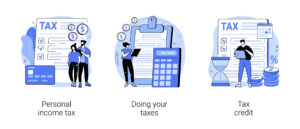Successful Investing With Taxes in Mind
There are many ways to earn money, but no matter how you get your income the IRS wants its piece of the pie. That includes any gains you make from your investments when you sell them. Although everyone does have to pay tax on their gains, you shouldn’t give the IRS any more than what you’re legally obligated to pay
With that in mind there are some strategies you can implement to be a tax-conscious investor. Contributing to a tax-differed retirement plan is a great way to save money. Although you will eventually have to pay tax on the income, you can accumulate a significant amount.
Another option is to consider tax-exempts. These are not for everyone, but if done right these investments can in some cases provide an investor with more gains than the after-tax return from a taxable investment would.
Mutual funds are another type of investment that can pay big dividends, but they must pay out their gains every year. That means unless you have losses from other stocks to offset those gains, you will need to pay taxes on them.
Anyone can invest, but not everyone knows how to invest wisely when it comes to taxes. If you would like to learn more about how to become a tax-conscious investor, then click here, or contact us at GROCO today. We can help you make wise investing decisions when it comes to your taxes. Call 1-877-CPA-2006 or click here to contact us online.
Income the IRS Can’t Touch
Income the IRS Can’t Touch There’s one readily available and legal source of untaxed income that we know of: municipal bonds. These securities are issued by state and local governments, school districts, hospitals and other public agencies to support community projects and services. To permit these worthy endeavors to raise money economically, Uncle Sam exempts…
Avoiding Real Estate Tax Revaluations
Avoiding Real Estate Tax Revaluations by Steven Singer, CPA As a result of the passage of Proposition 13 almost thirty years ago, real estate owners currently enjoy paying property taxes based on the property’s purchase price, value of improvements and an annual increase of 2% over the previous years’ assessed value. As a result of…
Annuities in Qualified Retirement Plans
Annuities in Qualified Retirement Plans By Russell Hill Using annuities in qualified retirement plans. Qualified annuities reduce your current taxable salary in addition to accumulating tax deferred earnings, when you contribute money to an annuities program through an employer (as one of the investment options in a salary reduction retirement plan). Those who work for…
Paying Too Much In Taxes?
Paying Too Much In Taxes? By Theodore Lanzaro Now that the end of the year is near, it is time to review a few business tax tips for 2008. Anyone who owns a business or is planning to start a new business in 2008 should be thinking about maximizing the profitability of their business and…


